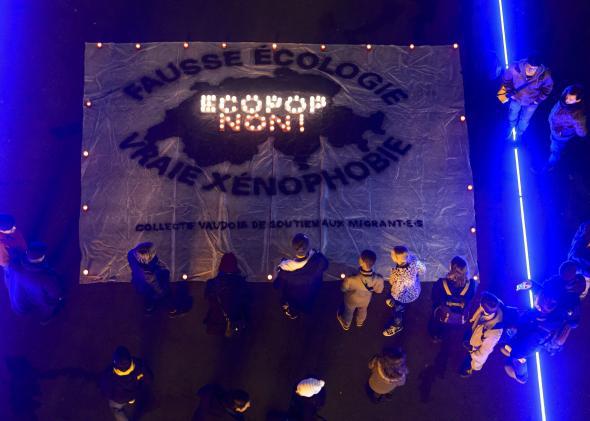Over the weekend, Swiss voters overwhelmingly rejected a proposal that would have cut the country’s net immigration to no more than 0.2 percent of the population. In practice, this would have meant a reduction from 80,000 to 16,000 immigrants each year. But while Swiss voters approved other restrictions to the country’s previously liberal immigration laws earlier this year, this measure apparently went too far.
What’s fascinating about the latest referendum is that was sponsored not by a far-right nationalist party, as the one approved earlier this year was, but by an environmentalist group. (Under Swiss law, citizens can force a vote on a referendum if they gather enough signatures.) That group, called Ecopop, argues that increased immigration will put a strain on the country’s natural resources. “Switzerland grew over the past seven years about 50 percent faster than the UK for example, and about five times faster than the European community as a whole,” the referendum’s author, Benno Buehler, told the BBC. “At this speed we are basically on the level of India. This is not sustainable.” The referendum also called for devoting 10 percent of Switzerland’s foreign aid budget to supporting family planning in developing countries.
Green nativism is fairly unusual in Europe, where opposition to immigration tends to be rooted in economic and cultural concerns. It has more of a history in the United States. The Sierra Club, one of America’s largest and oldest environmental groups, now supports reforms that would create a pathway to citizenship for the country’s undocumented immigrants, and environmental groups including Greenpeace and 350.org have similarly liberal views on immigration, but this wasn’t always the case.
As recounted in a detailed timeline by the Southern Poverty Law Center, the Sierra Club’s nativist streak dates back to at least 1968, when it published Paul Ehrlich’s bestseller The Population Bomb, which warned that overpopulation would lead to mass starvation. The Sierra Club never explicitly called for new laws restricting immigration, but throughout the 1970s and 1980s it urged the government to study the issue as part of broader efforts to stabilize population groups.
In 1989, the Sierra Club issued a statement urging that immigration be “no greater than that which will permit achievement of population stabilization in the United States.” In 1993, it stated that levels should be “reduced so that their levels are consistent with the U.S. and Canadian population policies.” That stance was the subject of intense internal debate, and in 1996 Sierra declared its neutrality on the immigration question. In 1998, its members rejected a referendum that would have declared the group opposed to immigration. Six years after that, the subject of immigration dominated the Sierra Club’s leadership elections, but the anti-restrictionists won out.
The club’s gradual abandonment of its anti-immigration sentiments coincided with efforts to expand the appeal of the U.S. environmental movement beyond its traditional affluent white base. This old line of thinking, though, lives on in the network of organizations founded by John Tanton, the retired Michigan ophthalmologist and amateur naturalist who led the Sierra Club’s Population Committee in the 1970s.
Tanton, one of the ideological godfathers of the modern anti-immigration movement, has helped found groups including Numbers USA, which led the opposition to George W. Bush’s immigration reform plans, the Federation for American Immigration Reform (FAIR), which helped draft Arizona’s controversial immigration law, and the Center for Immigration Studies, a leading non-profit anti-immigrant research organization. Tanton has also pushed, with limited success, for the anti-immigration movement to expand its outreach to traditionally liberal constituencies like environmental groups and supporters of Planned Parenthood.
Green nativists most recently made noise last Earth Day, when a group called Californians for Population Stabilization produced an ad accusing illegal immigrants of worsening the state’s drought.
There may have been some logic to the green nativist position in the days when wilderness conservation was the primary concern of the environmental movement. Immigration will increase the U.S. population and all those new people will use more resources and take up more space. But it makes less sense in the era of climate change. People will contribute to global warming wherever they are, and it would seem to be a wiser idea to move more of them to countries that are better equipped to handle the impacts.
And while it’s true, as restrictionists often note, that immigrants have children at a faster rate than native-born Americans, their birth rates are also falling at a faster rate. Leaving people in places with less economic opportunity and less access to healthcare and family planning is a poor way to slow population growth.
From a political perspective, it makes sense that advocates like Tanton want to attract more liberals to the cause, but associating immigration concerns with the environment is an odd choice. In a recent Gallup poll, 15 percent of Americans said immigration was the country’s most important problem, more than unemployment or healthcare. Only 1 percent were most concerned about the environment, so using the environment to make the case for border security seems tactically dubious. And given that 74 percent of Swiss rejected Ecopop’s referendum, which was also strongly opposed by the country’s Green Party, the argument doesn’t seem to be gaining much traction abroad either.
